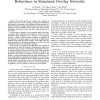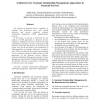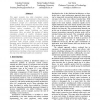HICSS
2005
IEEE
14 years 5 months ago
2005
IEEE
Multiple studies in the information systems (IS) literature recognize that information technology (IT) investments may not yield immediate returns. Nevertheless, there has been a ...
HICSS
2005
IEEE
14 years 5 months ago
2005
IEEE
Traditional governmental structures have organized the capture, use, and management of information along agency lines. These “information silos” are not very useful in a dynam...
HICSS
2005
IEEE
14 years 5 months ago
2005
IEEE
HICSS
2005
IEEE
14 years 5 months ago
2005
IEEE
We develop a game-theoretical framework to investigate the competitive implications of Consumer-to-Consumer electronic marketplaces, which promote concurrent selling of new and us...
HICSS
2005
IEEE
14 years 5 months ago
2005
IEEE
— Structured peer-to-peer systems have emerged as infrastructures for resource sharing in large-scale, distributed, and dynamic environments. One challenge in these systems is to...
HICSS
2005
IEEE
14 years 5 months ago
2005
IEEE
The majority of financial services companies in Germany and Switzerland have, with varying objectives and success, conducted customer relationship management (CRM) implementation ...
HICSS
2005
IEEE
14 years 5 months ago
2005
IEEE
Knowledge creation and sharing in organizations is most often assumed to involve direct interactions. It is true that the creation of shared knowledge is really only feasible when...
HICSS
2005
IEEE
14 years 5 months ago
2005
IEEE
The term social cognition is used in the psychology and organizational literatures to denote many different manifestations of the mental representations and processes that underli...
HICSS
2005
IEEE
14 years 5 months ago
2005
IEEE
Measurement of organizational knowledge assets is necessary to determine the effectiveness of knowledge management initiatives. A Knowledge Management Capability Assessment instru...
HICSS
2005
IEEE
14 years 5 months ago
2005
IEEE
This paper presents how state consistency among distributed control nodes is maintained in the presence of faults. We analyze a fault tolerant semi-synchronous architecture concep...



